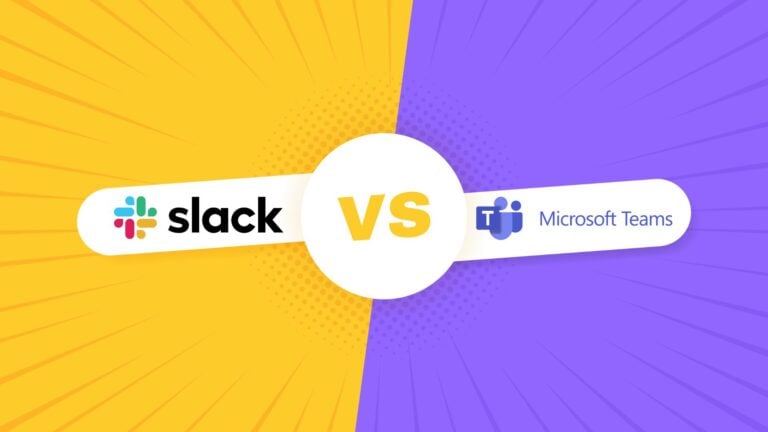Slack is a communication platform focused on fun and creativity. MS Teams is a highly scalable communication tool favored by large organizations. However, a third option, Connecteam, is an all-in-one collaboration solution.
Having the right tools to facilitate collaboration at your business boosts productivity, increases efficiency, and contributes to overall organizational success. Digital collaboration apps are the go-to solutions for this, and Slack and Microsoft Teams are two popular workplace collaboration apps.
However, the debate over Slack vs. Teams is one many business owners may be wondering about. Both offer a wide range of features and integrations that can help teams collaborate more effectively, but they do have distinguishing characteristics.
Not sure which platform is the right tool for your business? Not to worry. In this article, we break down Slack and Microsoft Teams’ features, compare their prices, and explore an even better option—Connecteam. We also include a comparison chat for a full overview of features.
What Is A Collaboration App?
Collaboration apps are software solutions designed to help teams work together more efficiently and effectively. They aim to improve communication and coordination among team members, even supporting those located in different parts of the world.
Collaboration apps provide a central platform where team members can communicate, share information, and work on projects together. This is done through group chats, private messages, video chats, file sharing, and screen sharing.
Collaboration apps help streamline workflows and increase productivity by providing a centralized platform where all team members can access and share information. They can also help reduce email overload, improve workplace culture, and ensure all team members are on the same page.
Two popular workplace collaboration tools are Microsoft Teams and Slack. Let’s dive into a comparison.
Microsoft Teams Overview
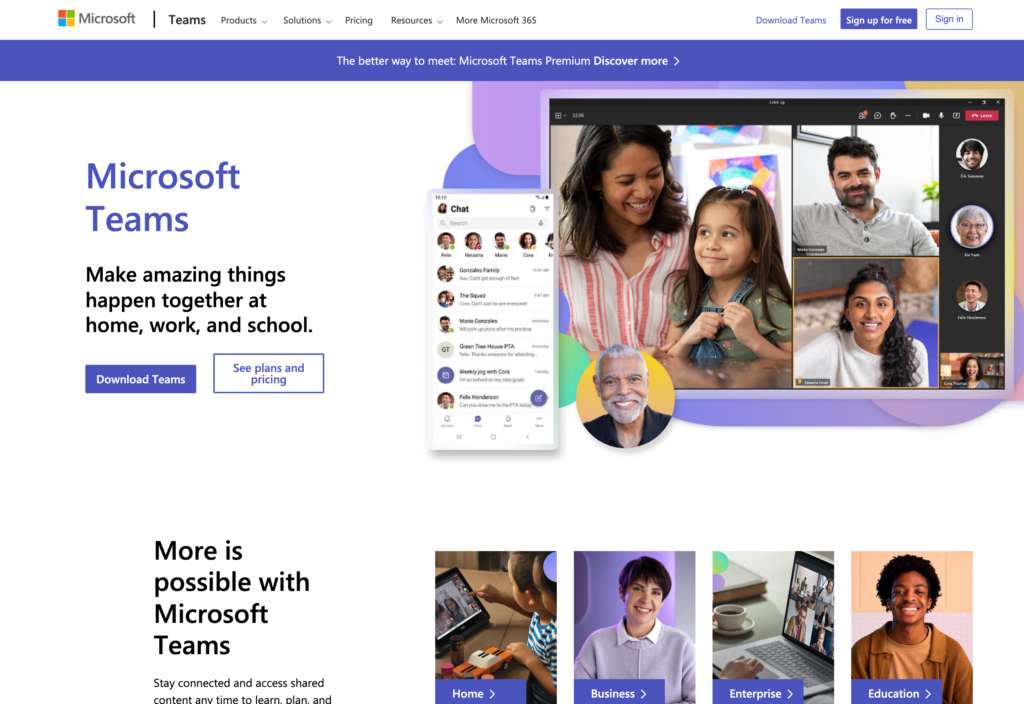
Microsoft Teams, also known as MS Teams or Teams, is a popular collaboration app. It’s often favored by large businesses because of its scalability. For example, MS Teams can support up to 1,000 users on a call. However, its features also suit startups, small businesses, and small teams.
MS Teams is part of Microsoft’s suite of office tools. Other applications include MS Excel, SharePoint, and OneDrive. MS Teams’ integration with other Microsoft products supports communication and collaboration with other departments.
MS Teams offers features like instant messaging, audio and video calls, group chats, document sharing, and the ability to record meetings. In addition, MS Teams offers screen sharing, browser extensions, and integrations with other popular work management apps such as Trello and Salesforce. It also offers in-app polls and surveys to gather employee feedback.
However, because of the complexity of its features, MS Teams can be tricky to master for those unfamiliar with collaboration apps.
🔑 Microsoft Teams’ Key Features
- Instant messaging. Users can send instant messages to individuals, teams, and custom groups. They can also use GIFs, picture messages, and emojis.
- Video conferencing. Teams allows users to host virtual meetings with up to 1,000 attendees. They can also share their screens, send and receive files, and record meetings.
- Multiple integration options. Teams offers integrations with over 700 other business software so users can create custom workflows.
- Highly customizable. Users can customize their workspaces within Teams. This includes adding tabs, chat bots, or AI bots to automate tasks and integrate third-party services.
- Mobile app. Stay connected on the go.
👍 MS Teams Pros
- Works seamlessly with other Microsoft software
- Can support video calls of up to 1,000 people
- Highly customizable
- Mobile app
- Easy file sharing
👎 MS Teams Cons
- Can be difficult to get used to
- Limited functionality for non-Microsoft users
Would you like to know more about Microsoft Teams’ features, pros, and cons? Read our full and honest Microsoft Teams review to see if it is a fit for your business needs.
Slack Overview
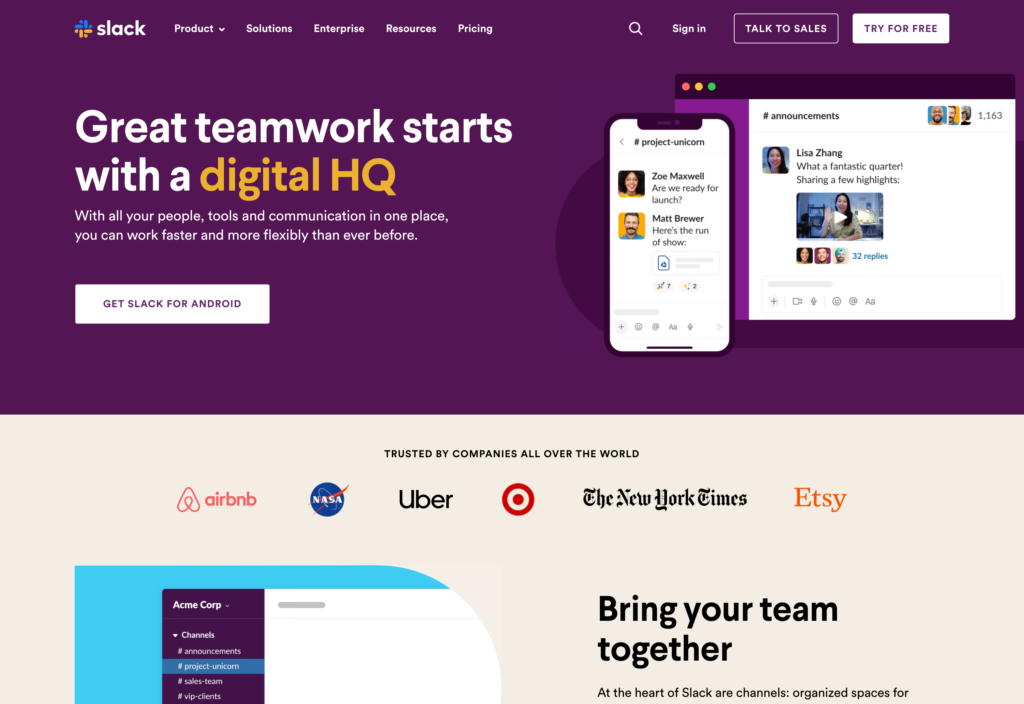
Slack is a popular workplace collaboration platform. It allows users to collaborate and communicate in real time, hold video calls, create group chats, and more. Users can also share images, emojis, links, files, and GIFs in messages.
Another strength of Slack is its ability to integrate with other tools and services. Slack integrates with a wide range of popular workplace management tools apps like Dropbox and Trello.
In addition, Slack offers multiple pricing options including a free plan and scaled billable rates to suit businesses of all sizes.
🔑 Slack’s Key Features
- Channels. Users can create channels for different teams, projects, or fun topics.
- Private messaging tools. Message teammates and colleagues one-on-one with Slack’s private messaging tools. Users can also send images, links, GIFs, emojis, and voice notes.
- Audio and video calls. Users can add up to 50 colleagues to video or audio calls. In addition, they can also share their screen during calls.
- Multiple integration options. Slack can be integrated with more than 2,400 other business software solutions.
- File sharing. Slack allows for easy file sharing between users.
👍 Slack’s Pros
- Free plan available
- Multiple communication methods in one app
- Wide range of integrations
- Easy file sharing
- Mobile app
👎 Slack’s Cons
- Pricey
- Limited features in free plan
💵 Slack vs. Teams Pricing
Slack
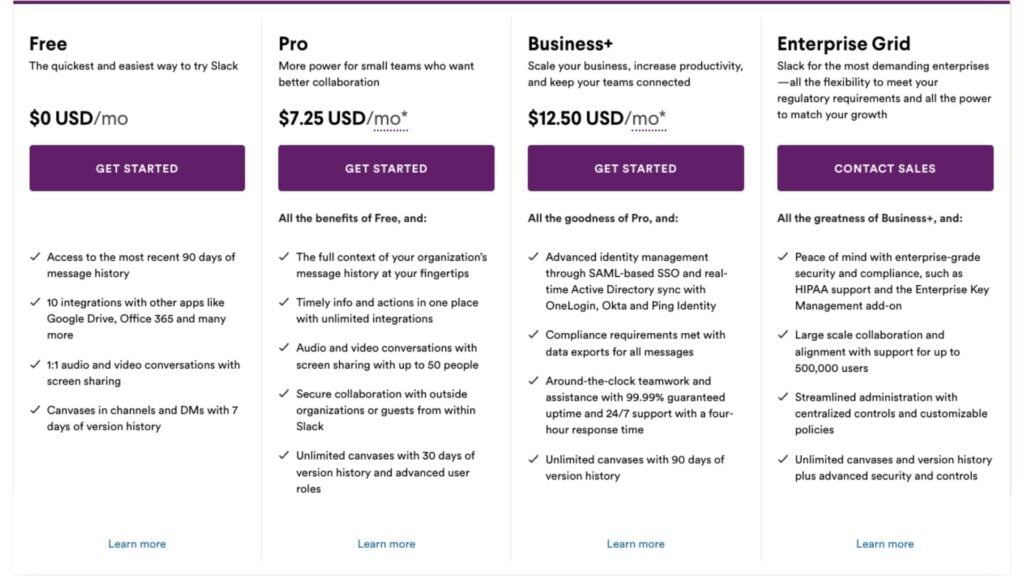
Slack offers both free and paid plans. The paid plans start at $7.25 per user, per month and are scalable. They also offer more features, including increased storage, unlimited message archives, and better integration options.
However, Slack’s free plan has limited features.
Slack is generally more expensive than Microsoft Teams as well, especially for larger organizations. That said, Slack offers a more customizable experience with a wider range of integrations.
MS Teams
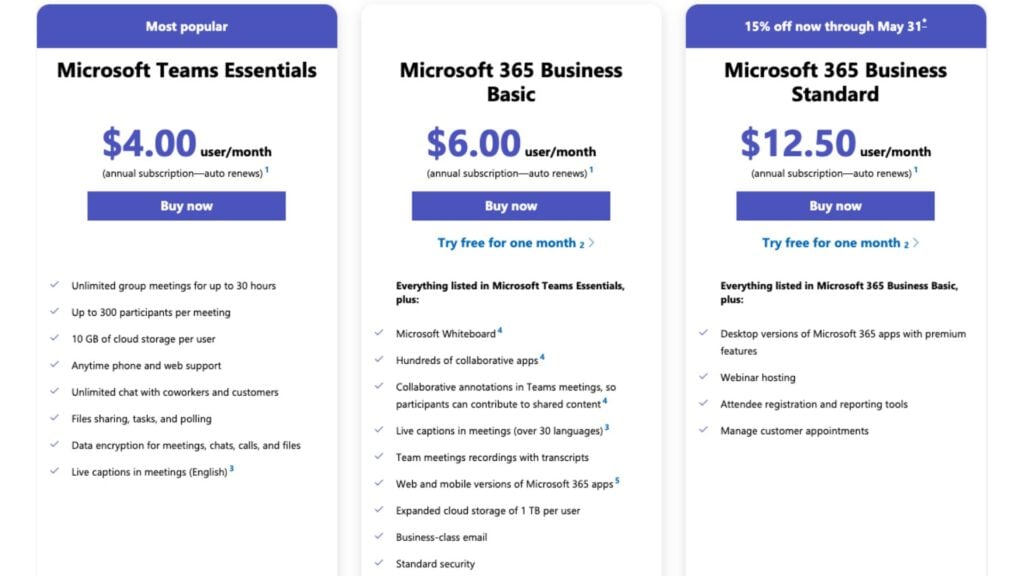
Microsoft Teams also offers a free plan, a free trial, and paid plans that start at $4.12 per user, per month. As with Slack, the paid plans offer more features, including increased storage, meeting recording, and advanced security features.
In addition, Microsoft Teams offers a customizable Business plan designed for larger organizations. It also offers custom pricing based on the number of users. Comparatively, Slack charges $12.50 per user, per month for its Business plan.
💡 Did You Know?
If you want an even more affordable communication solution than Slack or Microsoft Teams, you should try Connecteam. Connecteam is the best communication app for the mobile workforce and 100% free for small businesses. Premium plans start at only $29 for up to 30 users per month.
Take a look at our pricing here:
📚 This Might Interest You:
🔗 Best Microsoft Teams alternatives
🔗 Best Slack alternatives
🔗 Full and honest Slack review
🔗The Best File Sharing Apps For Businesses
📱 Slack vs. Teams User Interface
Slack
One of Slack’s key benefits is its intuitive user interface. The platform is easy to set up and navigate and is customizable.
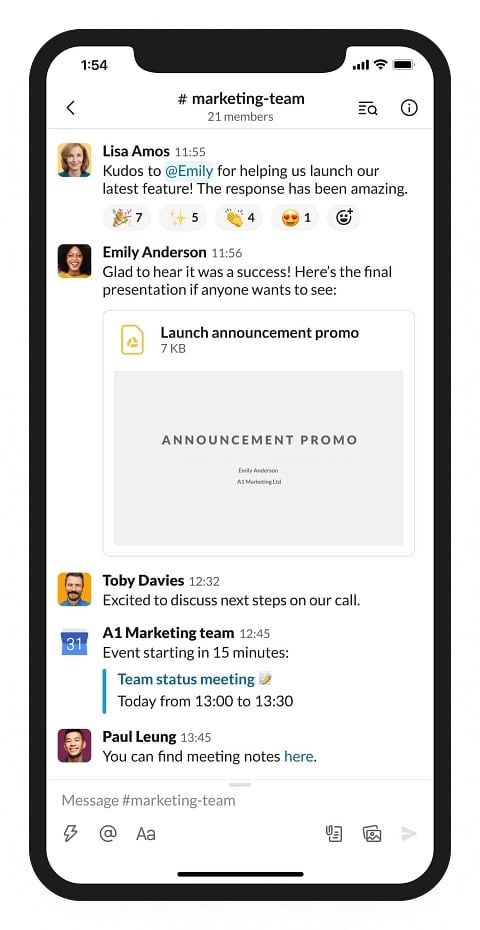
Users can create custom channels, add emojis, and integrate with other popular apps and services. This makes it easy to tailor Slack to the needs of a business or project. For example, managers can create a channel dedicated to photos of employee pets, what employees are having for lunch, or even a “Rise and Shine!” channel where everyone can say “good morning.”
Slack’s interface is divided into different sections in a left-hand-side toolbar. Slack’s design focuses on highlighting user-created channels and one-on-one chats. Users can quickly view direct messages, threads, mentions, drafts, and unsent messages in this toolbar.
MS Teams
The Teams platform is also divided into different sections along a toolbar on the left-hand side. It offers a structured interface with various customization options and additional features. The main navigation menu has separate tabs for chat, teams, calls, files, and activity functions.
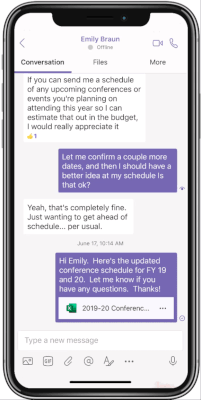
The chat section allows users to communicate with individuals or groups, while the teams section provides a space for team collaboration through group chats. The calls and files sections offer easy access to calling and file-sharing features. Additionally, Teams offers a range of customization options, such as custom backgrounds and themes.
In addition, MS Teams offers project management tools to help users collaborate with teammates and manage projects. These include file sharing, the ability to work collaboratively on files, integration with task management tools, and a search feature to look up keywords from conversations.
💬 Slack vs. Teams Channels and Meetings
Slack
Slack focuses on the use of “channels” for team communication and collaboration. Channels are essentially chat rooms where team members collaborate on specific projects or topics.
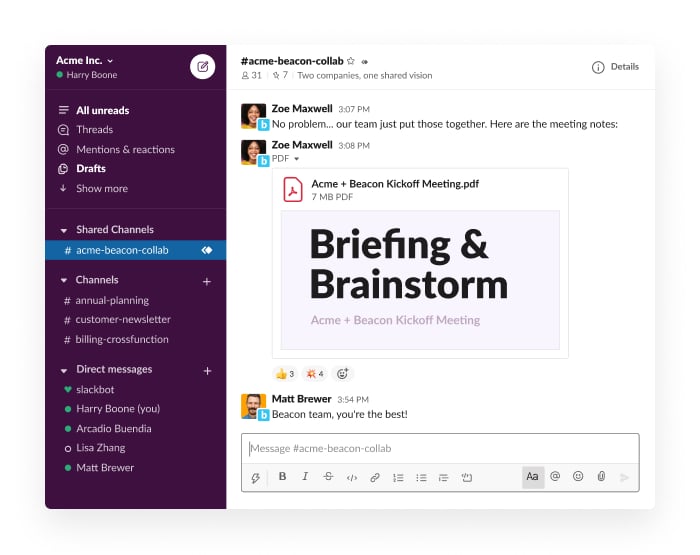
They can also be created for fun topics like “Employee of the month” or “Team birthdays.” Users can create new channels, invite team members, and share files and links within channels.
In addition, Slack offers a call feature called “huddles.” These huddles can host up to 50 users on Slack’s paid plan, and they support both audio and video. However, with Slack’s free plan, huddles are limited to 2 users.
Users can request huddles with a specific person, a group of people, or an entire channel. Slack gives users the option to leave a message if the person they request a huddle with doesn’t answer. During huddles, users can share their screens and send and receive messages, files, and more.
MS Teams
As in Slack, teamwork and communication on MS Teams happens in channels. Channels can be organized by group, project, feature, or whatever else is relevant to you and your team.
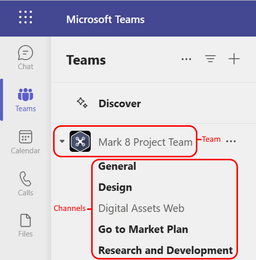
One of the benefits of Teams over Slack is that users can schedule calls using Team’s integration with Outlook Calendar. With Slack, users can call only in the moment or agree to a call time beforehand.
In addition, Teams can support up to 1,000 users on one call, while Slack allows only 50.
🤝 Slack vs. Teams Integrations
Slack
Slack offers a wider range of integrations than MS Teams. This makes Slack a better option for larger businesses that have established workflows and processes that involve third-party software.
Slack integrates with over 2,400 apps, including Trello, Asana, Google Drive, and Zoom. In addition, Slack allows users to create custom integrations using its Application Programming Interface (API). This gives users more control over how they integrate third-party tools into their workflows and how these tools communicate with one another. Teams, on the other hand, relies on pre-built integrations that may not be as customizable.
MS Teams
MS Teams integrates with over 700 third-party apps, including Trello, Asana, Google Drive, Dropbox, and Zoom. While this selection of integrations is lower than Slack’s, it still contains all the most popular options.
In addition, if a business already uses Microsoft products, MS Teams works seamlessly with other tools in this package. This includes Office 365, SharePoint, and OneDrive.
🏆 Slack vs. Microsoft Teams: Which Is Better?
Slack and Microsoft Teams are both popular collaboration software solutions, and they each have their advantages.
Slack is known for its ease of use, intuitive interface, communication through GIFs and emojis, and integrations with various third-party apps. It offers features like customizable channels, file sharing, and video huddles.
Microsoft Teams, on the other hand, offers more than just messaging, video conferencing, and file sharing. It includes features like project management tools, integrations with task tracking software, and real-time collaboration on files. MS Teams also integrates with other Microsoft apps like Outlook, SharePoint, and OneDrive.
Slack may be the better choice for users looking for a simple, user-friendly platform for basic messaging and file sharing. MS Teams may be the way to go if users need a more comprehensive platform with project management capabilities and integrations with other Microsoft apps.
While both Slack and MS Teams offer a wide range of features, there’s a powerful collaboration tool that stands out above the rest: Connecteam.
Connecteam: The Ultimate Collaboration Tool
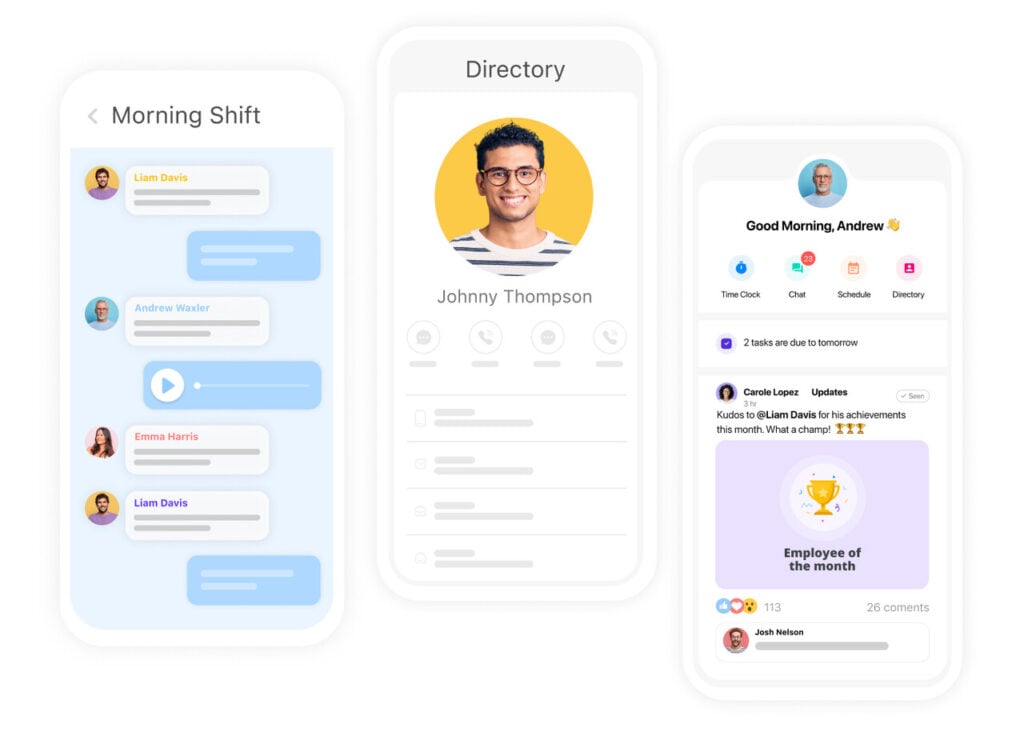
Connecteam is an all-in-one work management tool with powerful features for collaboration. There’s a built-in team chat, updates feed, employee directory, company knowledge base, and so much more.
Plus, from the central dashboard, you can communicate with your team, access detailed reports on absence and attendance, update time entries, modify admin access, create digital task lists, and more.
Let’s take a closer look at some of Connecteam’s features.
In-app chat for seamless communication
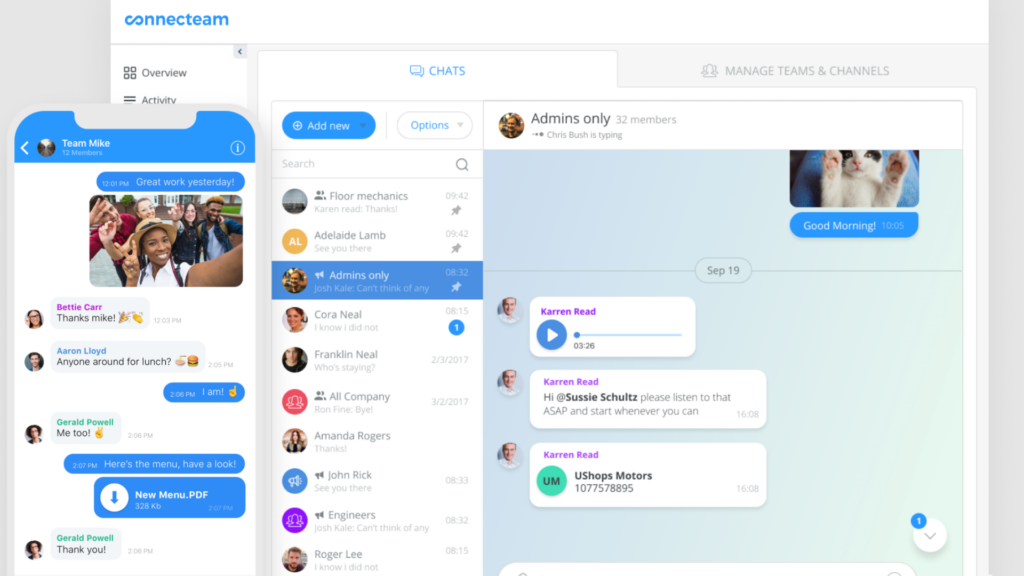
Connecteam has built-in online team chat that makes it easy to stay connected with your team in real time no matter where you are or when you’re working. You can send individual messages or create groups to chat with multiple people at once. Connecteam also lets you mute and favorite whichever conversations you need to so your communications are always organized.
Using the chat feature, your team members can ask and get answers to questions instantly, post updates on task progress, share information with colleagues, and so much more. You’re able to send audio notes, images, videos, and files in messages. Plus, push notifications ensure no message is missed.
Managers and users with admin status can set and update user permissions so only specific people can access chats. Connecteam also restricts users from saving or exporting chats, and only current employees can access chats. All data is stored in a highly secure private cloud as well.
Company newsfeed keeps everyone up to date

Connecteam also has a social media-style newsfeed that ensures your team is always in the loop on important company information. With it, you can easily share updates and announcements with certain groups of people or your entire organization at the same time.
Additionally, you can include photos, videos, and GIFs to make your announcements more engaging. Workers can interact with updates by liking and commenting on them. You’re also able to schedule posts to go live at specific times.
As with the in-app chat, Connecteam sends notifications to all employees when there’s a new post in the newsfeed. Managers can check at a glance who’s seen and responded to new posts as well.
Knowledge base to centralize important company information
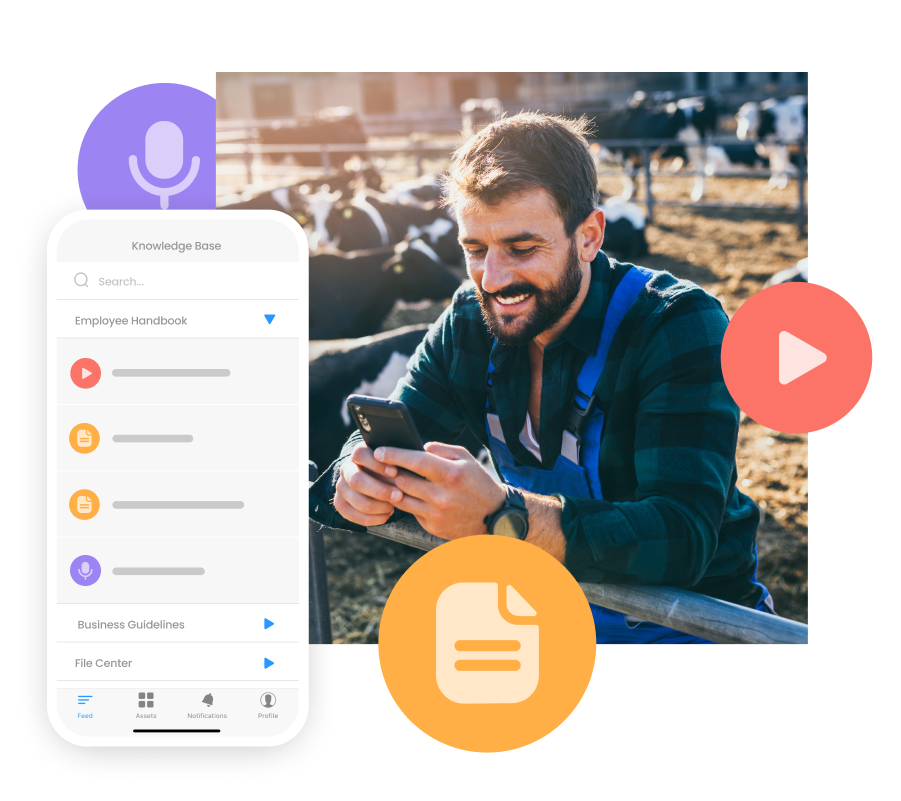
Connecteam allows you to create a company knowledge base where you can save, manage, and edit all of your business’s important documents. These can include the employee handbook, HR policies, training materials, workplace processes, client information, and more. You and your team members can also collaborate on documents simultaneously.
You have the option to customize user access permissions as well. This way, only the appropriate people can view and edit specific documents. Additionally, you can automatically revoke access to the knowledge base when an employee resigns from your company. This will safeguard sensitive business information.
All documents are securely stored in the cloud, and files are automatically synced so everyone sees the latest version of each document in the knowledge base. Connecteam’s search function makes it easy to locate the information you need. And with Connecteam’s mobile app, you can access documents on the go.
Moreover, Connecteam lets you store an unlimited number of files with no size restrictions.
An employee directory keeps communications flowing
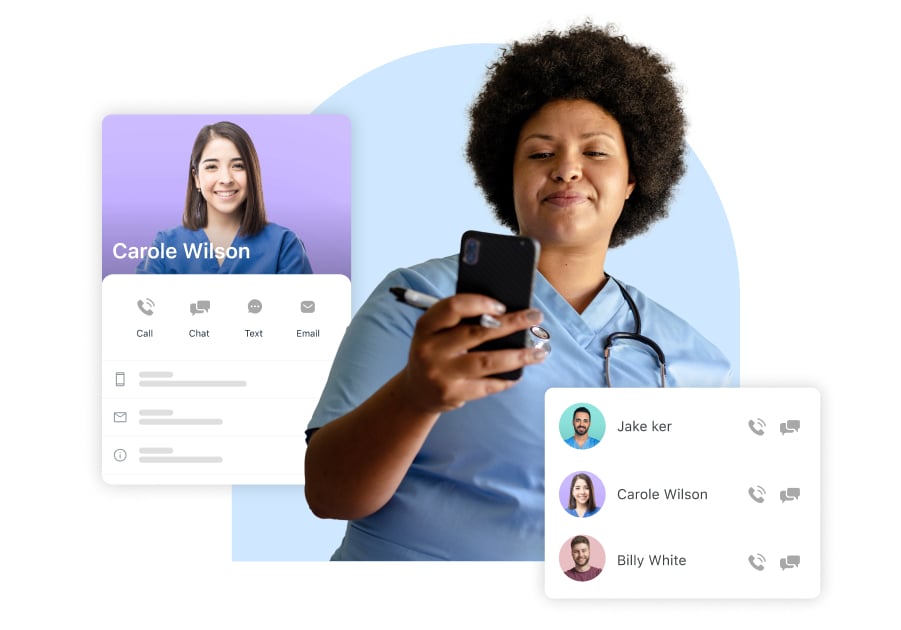
With Connecteam, you can build an employee directory that automatically updates workers’ profiles with contact details. You can contact colleagues via email, phone call, or direct message through Connecteam’s in-app chat. This ensures easy communication with no roadblocks, which makes collaboration that much easier.
What’s more, employees have the ability to set preferred contact hours to receive messages. This prevents messages, emails, or calls from being sent outside of work hours.
In addition, the directory includes a search function that allows you to look up coworkers by name, job title, location, department, and other criteria.
Custom polls and surveys for quick and easy team decision-making
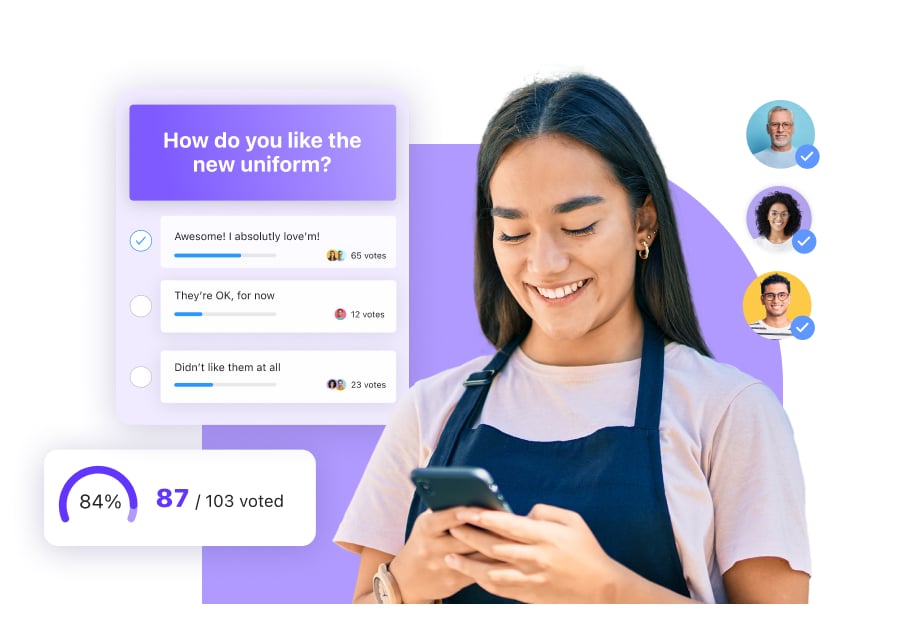
Connecteam allows you to create surveys and polls using pre-designed templates or customize them with ratings and open-ended, multiple-choice, and yes/no questions. You can gather feedback from your entire team or specific workers to make informed decisions during every stage of the collaboration process. With Connecteam’s live digital polls, you can see these results in real time for even faster decision-making.
Connecteam will also send notifications to workers to complete surveys or polls, and managers are able to view who has filled them out. You also have the option to create anonymous surveys, encouraging your employees to be open and honest with their feedback.
Task management tools keep your team on target
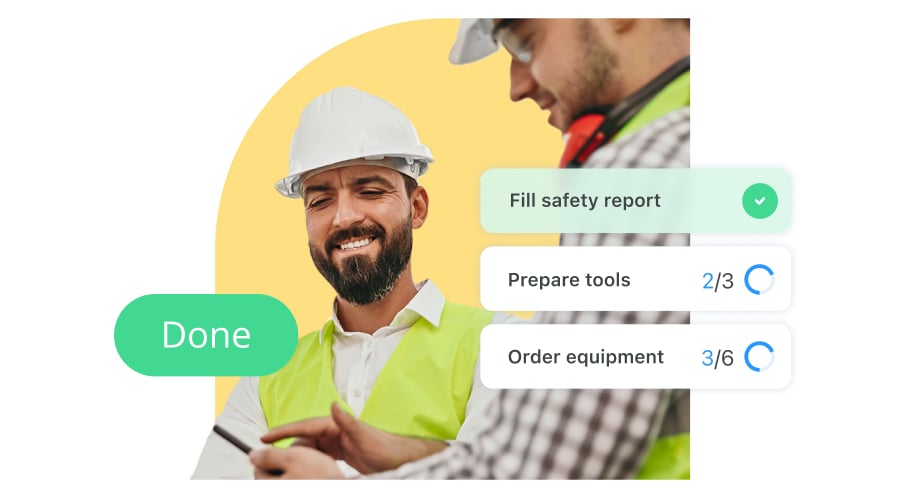
Connecteam offers a range of task management tools as well. You can create digital forms and recurring checklists to share with your team and set up recurring and automated tasks.
Employees receive notifications when they’re assigned tasks, and you can add deadlines, notes, files, and more to tasks. This way, no one’s out of the loop and everyone has the information they need.
What’s more, Connecteam’s task management tools integrate with the chat feature. You can assign task lists to group chats so everyone involved can keep up with the team’s progress. Plus, Connecteam has a dedicated communication channel for tasks. This streamlines communication and improves collaboration.
Scheduling tool enables workers to swap shifts with colleagues
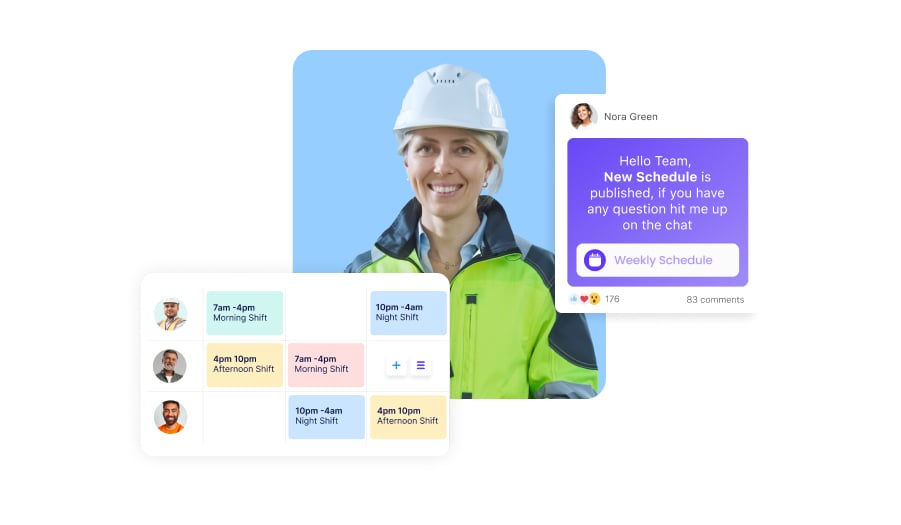
Connecteam’s drag-and-drop employee scheduler enables you to create and publish employee schedules in minutes. Use shift templates, set common shifts to recur, and schedule employees based on their qualifications, locations, or preferences. You can also create open shifts that anyone can sign up for.
Furthermore, Connecteam allows your employees to request to swap shifts with their coworkers. This helps prevent conflicts and issues before collaborations even begin.
Time clock, reports, integrations, and so much more

Connecteam’s built-in time clock makes it easy for employees to track their hours. It’s GPS-enabled and accurate down to the second—no more time estimates or mistakes in timesheets! You can check employees’ real-time locations while they’re on the clock, reduce time theft, and ensure workers’ time entries are error-free.
Similar to what some other time tracking apps (like Clockify and Toggl) offer, Connecteam also allows employees to enter tracked time manually if they forget to clock in or out.
You can use Connecteam as a time kiosk as well. Multiple workers can clock in and out from a shared device in a designated location.
Connecteam will collate this time data into digital timesheets you can use for payroll processing. It also integrates directly with Gusto and QuickBooks online, or you can simply export timesheets to use with whichever payroll provider your company prefers.
In addition, Connecteam lets you generate custom reports on employee hours, absences, hours spent on projects, vacation time taken, and much more. You can use this information to identify areas for improvement to further optimize your workflows and improve communication and collaboration across your business.
Connecteam also offers various integrations to help streamline your workflows and make it easier to manage your team. For example, you can connect with Quickbooks, Dropbox, Asana, Trello, Google Drive, Dropbox, Salesforce, and more.
Connecteam’s pricing
Connecteam has a range of pricing plans to support businesses of all sizes. These include:
Small Business Plan
This plan is completely free for up to 10 users for life. It’s perfect for small businesses, startups, or those just getting started with collaboration tools. This plan gives full access to all Connecteam’s basic features.
Basic Plan
Connecteam’s Basic Plan costs $29 per month for up to 30 users and just $0.50 for each additional user. (You’re able to add unlimited users with all Connecteam packages.) This plan includes additional features such as payroll software integrations, GPS time tracking software, and a task list quick view.
Advanced Plan
The Advanced Plan costs $49 per month for up to 30 users and $1.50 for each additional user. This package includes everything in the Basic Plan, as well as auto clock-out, recurring task setting, and geofencing tools.
Expert Plan
The Expert Plan, Connecteam’s premium plan, costs $99 per month for up to 30 users and $3.00 for each additional user. This plan contains everything in the Advanced Plan, as well as in-app shortcuts, GPS location tracking, new device log-in alerts, and more.
Key features
- In-app chat: Stay in touch with your team members from anywhere, at any time.
- Company newsfeed: Share important updates and announcements with everyone in your business and see who interacts with your posts to monitor engagement.
- Employee directory: You’re able to find exactly who you’re looking for and contact them by email, phone, or message right from the Connecteam app.
- Knowledge Base: You can access all company information from a single, centralized location and collaborate on documents with other team members.
- Task management tools: These help ensure no one on your team falls behind on project progress. The task-specific communication channel streamlines collaboration even further, separating conversations about tasks from other workplace chats.
- Surveys and polls: Connecteam makes it easy to create and share surveys and polls to gather instant feedback from your team.
Connecteam pros
- Mobile app
- Free-forever plan
- Highly customizable
- Intuitive user interface
- All-in-one solution
Connecteam cons
- No video conferencing features yet
Compare Slack vs Teams vs Connecteam
| Slack | MS Teams | Connecteam | |
|---|---|---|---|
| Channels (Group chats) | Yes | Yes | Yes |
| Private messages | Yes | Yes | Yes |
| Unlimited messages | Yes | Yes | Yes |
| Message searching | Yes | Yes | Yes |
| Number of users | Unlimited | Up to 500k | Unlimited |
| Number of users on a call | 50 | 1000 | Unlimited |
| File sharing | Yes | Yes | Yes |
| Screen sharing | Yes (Not in free plan) | Yes | Not currently |
| Video calls | Yes | Yes | Not currently |
| Audio calls | Yes | Yes | Not currently |
| Company directory | Yes | Yes | Yes |
| Video conferencing | Up to 15 users | Up to 250 users | Not currently |
| Central knowledge base | No | No | Yes |
| Health and safety hub | No | No | Yes |
| Mobile app | Yes | Yes | Yes |
| Integrations | 2000+ options | 700+ options | 100+ |
| Employee event updates | No | No | Yes |
| GPS-enabled time clock | No | No | Yes |
| Project management tools | No | No | Yes |
| Project dashboard | No | No | Yes |
| Digital organization tools | No | No | Yes |
| Polls and surveys | No | Yes | Yes |
| Shift scheduling tools | No | No | Yes |
| GPS time tracking | No | No | Yes |
If you’re considering other options, explore our guide to the best team communication apps for small businesses to find the perfect fit for your team.
The Bottom Line on Collaboration Apps
Collaboration apps are an essential tool for any business. They enable teams to communicate, collaborate, and stay connected regardless of their physical location. While many collaboration apps are available, Connecteam stands out as a reliable, efficient, and affordable option.
Connecteam is a powerful, all-in-one team management and collaboration tool. The platform offers a range of features to help businesses stay connected and productive. These include drag-and-drop shift scheduling, in-app chat features, customizable push notifications, and so much more. Connecteam is also completely free for up to 10 users for life, and paid plans start at just $29 per month for up to 30 users.
Get started with Connecteam for free and see what it can do for your business.
🆚 Related Comparisons:


